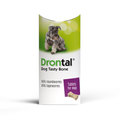With the cold weather looking to be staying put, many people are being taken ill with colds and flu. While you might protect yourself with a flu jab or have the medicine cabinet stocked just in case, your dog can't take these precautions.
Dogs can also get ill at this time of year, with dog flu often being an issue; especially if your pet is around other canines regularly. Dog flu was originally discovered in 2004, after the virus was found to jump from horses to racing dogs. It is a respiratory infection that can become serious if not treated.
Just like with human flu, there is an immunisation available to protect your dog. If you have heard reports of outbreaks of dog flu in your area, it would be a good idea to get your pooch to the vet for a check up and the flu immunisation.
 If you are concerned that your dog has already caught the flu, this is cause for a quick trip to the vet also. Symptoms include lethargy, a cough, loss of appetite, a runny nose, a fever and respiratory infection. The flu can be similar to kennel cough and can continue for a long time if not treated.
If you are concerned that your dog has already caught the flu, this is cause for a quick trip to the vet also. Symptoms include lethargy, a cough, loss of appetite, a runny nose, a fever and respiratory infection. The flu can be similar to kennel cough and can continue for a long time if not treated.
Most of the time dog flu isn't serious, but it can be uncomfortable for your pooch. Your vet will most likely prescribe a few different medications that you will need to administer. You'll also have to ensure they are fully hydrated, which could mean a stay at the vet and a drip in more extreme cases.
To avoid your pet catching flu, you should keep them away from any areas that have experienced an outbreak, as well as any dogs that may be affected. You should also steer clear of these areas even when your dog isn't with you, as you could end up carrying the virus home.
You'll still need to do this even if your pooch has been vaccinated as the vaccine will only protect against certain strains of the virus and so your dog could still contract the flu, although the chances are significantly lowered.
If you have any experiences of dealing with dog flu, please comment below for our other readers.
Written by: Hannah









